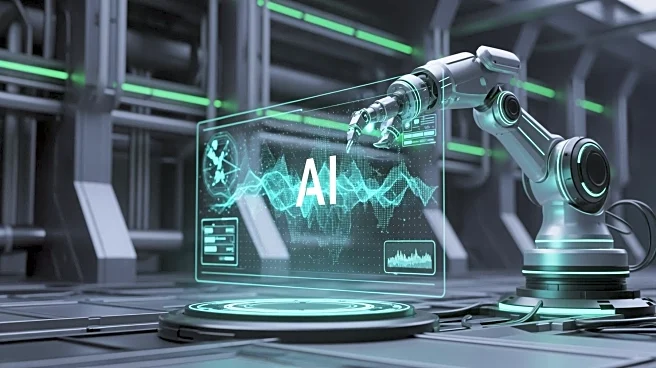What's Happening?
The industrial AI market has seen significant growth, with its value reaching $43.6 billion in 2024 and projected to grow at a compound annual growth rate of 23% through 2030. This expansion is largely
driven by the increasing interest in generative AI and the emergence of agentic AI systems. Generative AI, although currently representing a small portion of industrial AI use cases, is gaining traction for its potential in operations and service support, code generation, and across the manufacturing value chain. Meanwhile, agentic AI is being explored for its ability to replace static rules in manufacturing execution systems, offering dynamic adaptation and optimization capabilities. Major companies like Siemens and Accenture are investing heavily in these technologies, with Accenture announcing a $3 billion investment in generative AI projects.
Why It's Important?
The growth of industrial AI signifies a shift in manufacturing strategies, with AI becoming a central component of governance and performance frameworks. This development is crucial for U.S. manufacturers, who are increasingly adopting AI to enhance efficiency, reduce costs, and improve quality. The integration of AI into manufacturing processes can lead to significant savings, as demonstrated by companies like Renault and Georgia-Pacific. The rise of generative AI and agentic AI offers new opportunities for innovation and optimization, potentially transforming the industrial landscape. As AI becomes more embedded in manufacturing strategies, it could lead to increased competitiveness and productivity in the U.S. industrial sector.
What's Next?
The industrial AI market is expected to continue its rapid growth, with generative AI projected to comprise a quarter of industrial AI projects by 2030. Companies are likely to increase their investments in AI technologies, focusing on developing domain-specific models and enhancing AI capabilities across the manufacturing value chain. The adoption of agentic AI systems is anticipated to accelerate, offering more dynamic and adaptive solutions for manufacturing processes. As these technologies evolve, manufacturers will need to navigate challenges related to data integration and model training to fully leverage AI's potential.
Beyond the Headlines
The integration of AI into manufacturing processes raises ethical and cultural considerations, particularly regarding workforce displacement and the need for upskilling. As AI systems become more autonomous, manufacturers must address concerns about transparency and accountability in decision-making processes. Additionally, the development of industrial foundation models highlights the importance of domain-specific data, which may require new approaches to data management and collaboration between industry stakeholders.









